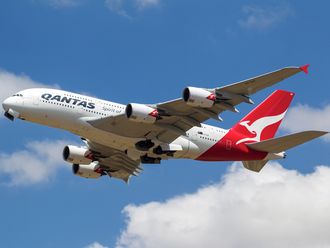London: Theresa May’s plans for taking Britain out of the European Union remain on track after members of Parliament cleared the way for her Brexit law to advance — but threatened to rewrite it later.
In a vote after midnight, lawmakers agreed to allow the EU withdrawal bill to continue its progress through Parliament, by 326 votes to 290. The prime minister won after her government promised to discuss critics’ concerns before they have to vote again, and to consider allowing more time for the next stage of debates on the law. The main opposition Labour Party proposed a first set of amendments within hours.
The Brexit bill will formally end Britain’s EU membership and overturn the supremacy of European law in the country. It is controversial because it hands sweeping powers to ministers to change legislation as they see fit, without full scrutiny in Parliament.
“Parliament took a historic decision to back the will of the British people,” May said in an emailed statement after the vote. The bill will give “certainty and clarity” ahead of Brexit and lawmakers “from all parts of the UK” should “work together in support of this vital piece of legislation.”
Having lost her majority in the House of Commons in June’s election, May is vulnerable to rebellions from her own side and relies on the votes of Northern Ireland’s Democratic Unionist party. Helpfully for her, seven Labour lawmakers disobeyed their own leader Jeremy Corbyn’s orders to vote against the bill, while another 17 abstained.
Henry VIII Powers
May says she needs the broad powers in the law because hundreds of British laws will need to be corrected to remove references to the EU after Brexit. But a succession of Conservative lawmakers joined the opposition to warn that these Henry VIII clauses — named after the 16th century Tudor king — need to be watered down at a later stage.
“There have been a lot of arguments in the past about Henry VIII powers and about the executive taking power away from Parliament,” former Tory Chancellor of the Exchequer Ken Clarke told lawmakers Monday. “The danger now is not only the consequences of this bill and of the details of Brexit, but that if the House does not challenge this bill and change it, it will be quoted as a precedent for years to come.”
The debate was on the second reading of the bill, when lawmakers are asked to vote on the general principle, rather than the details. Ahead of the ballot, May’s spokesman James Slack told reporters that the government had “been clear that we are going to listen to the concerns.” Several Tories said that on this basis they would back the bill — at this stage.
The government also survived a vote on the timetable for debating the bill — with Clarke the only Tory rebel. It will be limited to eight days. A defeat there would have flagged early signs of trouble for May.
Amendments
Within hours of the late night vote, Labour submitted a raft of amendments seeking to curtail the Henry VIII powers, return responsibilities to the devolved administrations in Scotland, Wales and Northern Ireland, and protect workers’ rights, environmental safeguards and equality laws. The party also wants the terms and duration of any post-Brexit transition period to be decided by Parliament, rather than ministers.
“This is such a flawed bill that the prime minister should have dropped it and started again,” Labour’s Brexit spokesman, Keir Starmer, said in a statement. The bill “will need extensive amendment and improvement in a whole range of areas. This is likely to cause delays and division in Parliament, and the prime minister has nobody to blame but herself.”
Plaid Cymru said it had submitted its own amendments, with the Welsh party seeking to keep Britain in the EU’s single market and customs union after Brexit. The Liberal Democrats and Scottish National Party also said they’d seek changes.
“The challenge now is for MPs across the chamber to unite behind a common purpose in ensuring that this UK government is prevented from railroading further Brexit legislation through that risks the very foundations of devolution,” the SNP’s international affairs spokesman, Stephen Gethins, said.












